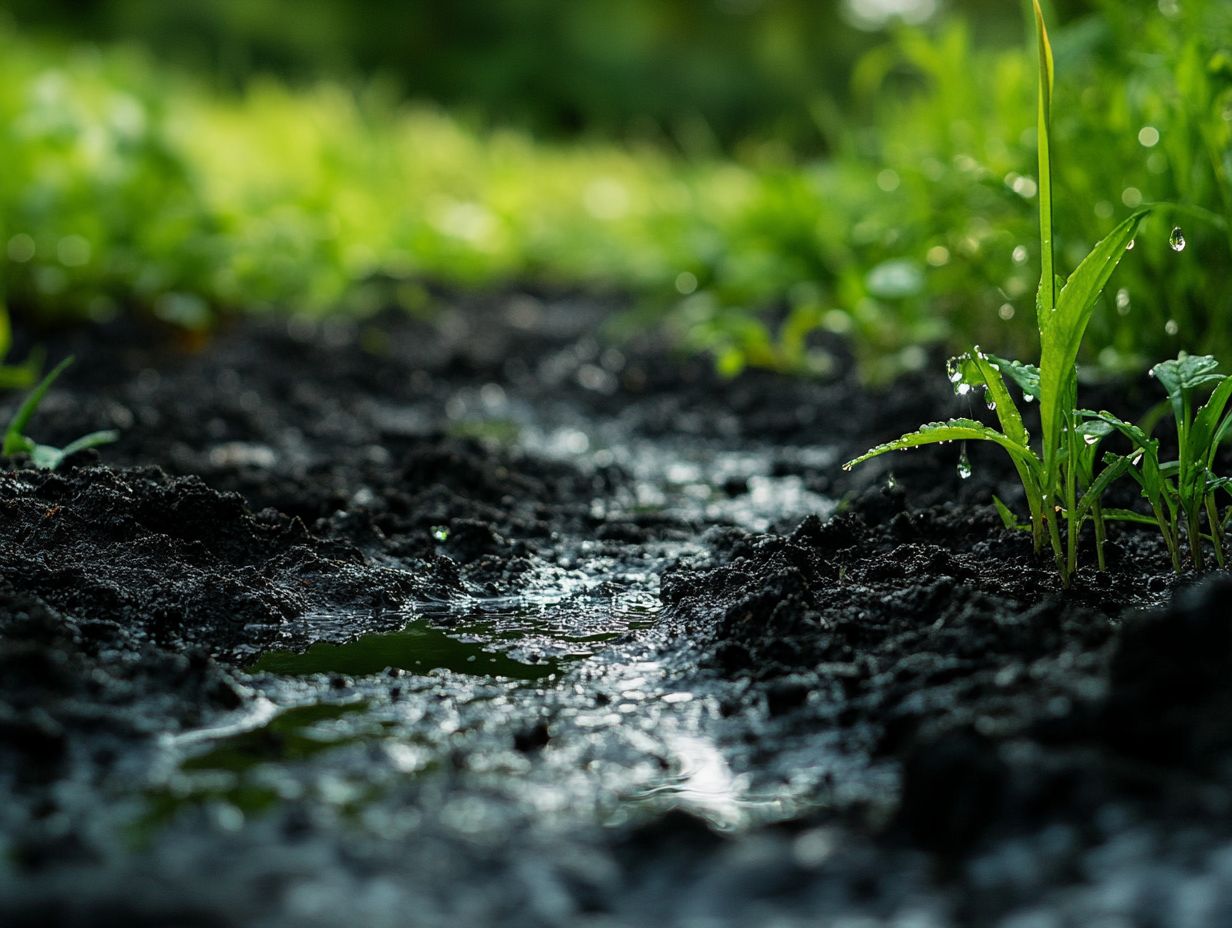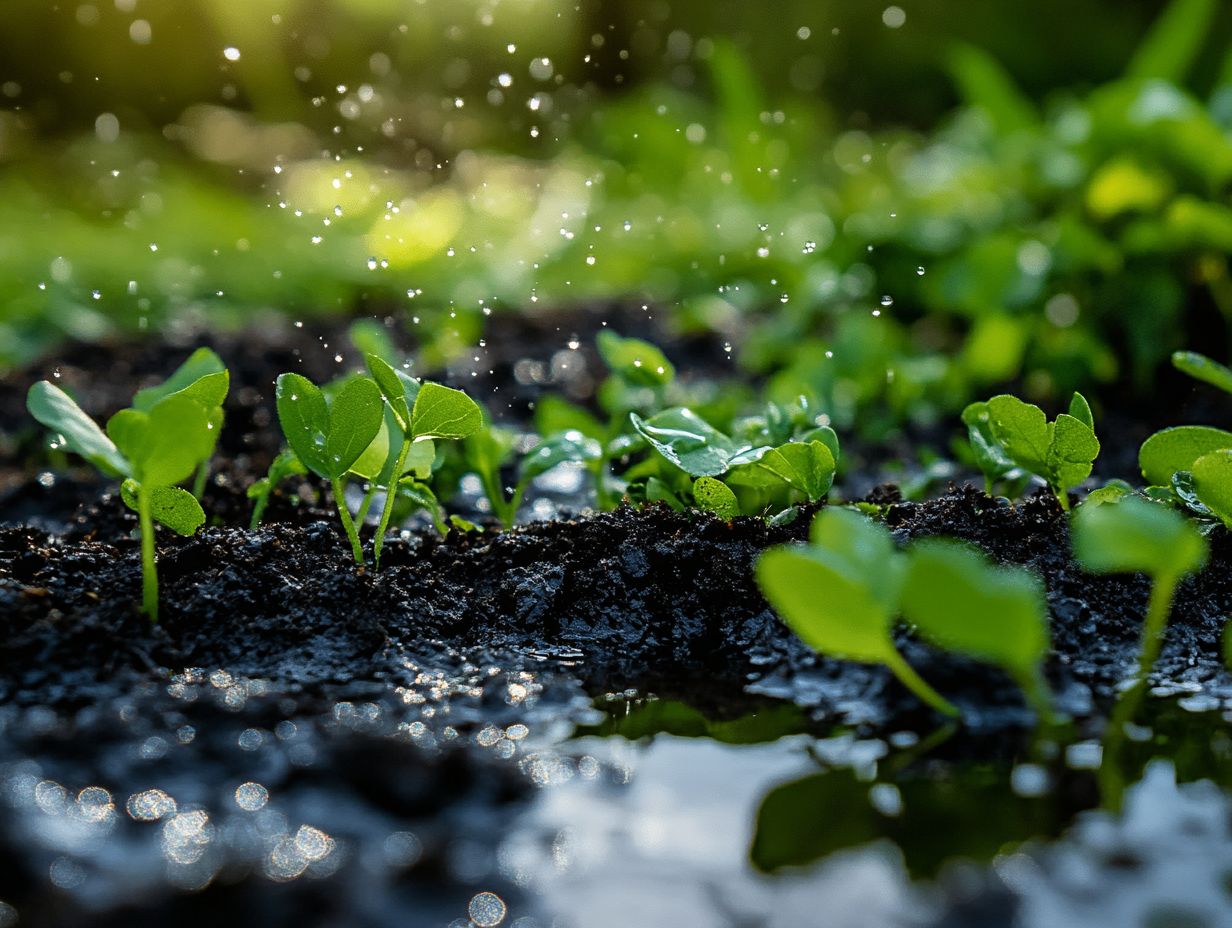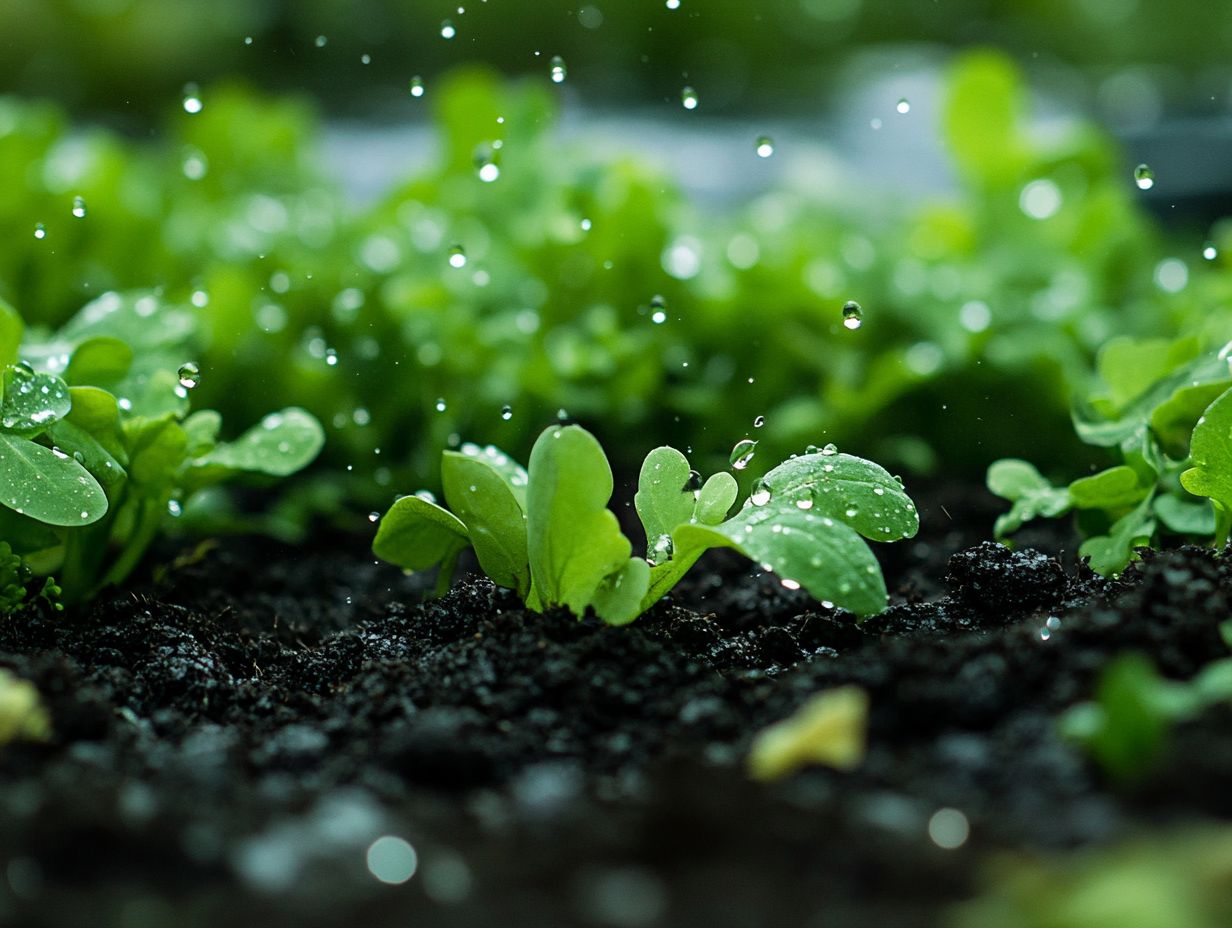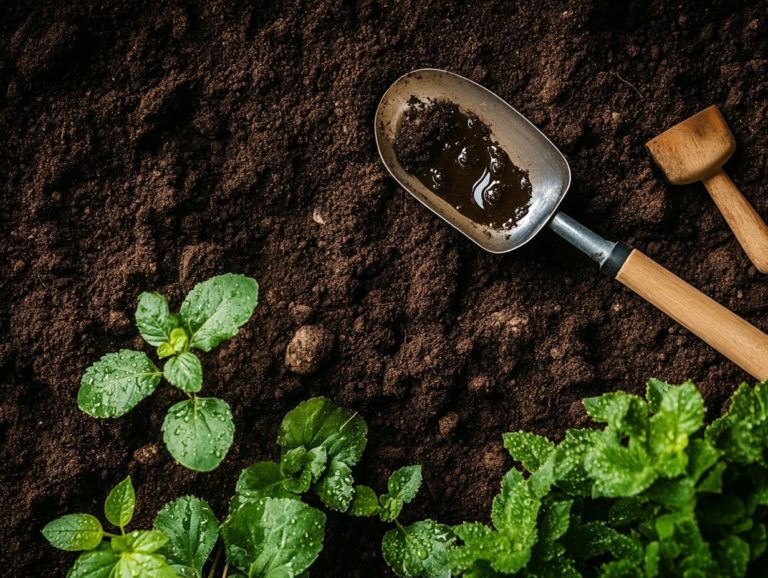The Connection Between Water and Soil Health
Water and soil stand as essential pillars of your ecosystem, intricately linked in a relationship that impacts everything from agricultural productivity to environmental sustainability.
Grasping how water quality and management influence soil health is vital for promoting robust plant growth and maintaining ecological balance.
This article delves into the effects of water on soil composition, shares effective water management techniques to enhance soil vitality, and highlights the benefits that arise from nurturing this crucial connection.
Join us on this exciting journey to discover how water and soil health can transform our environment!
Contents
- Key Takeaways:
- The Importance of Water and Soil Health
- Effects of Water on Soil Health
- Ways to Improve Soil Health Through Water Management
- Benefits of Improving Water and Soil Health
- Frequently Asked Questions
- What is the connection between water and soil health, including water quality and soil health?
- How does water impact soil health?
- Can water quality affect soil health?
- How does soil health affect water quality?
- What steps can be taken to improve the connection between water and soil health?
- Are there any long-term benefits of maintaining a strong connection between water and soil health?
Key Takeaways:

- Water and soil are deeply connected and greatly affect each other.
- Healthy water and soil help plants grow better.
- Smart water management boosts soil health and benefits the environment and farming.
The Importance of Water and Soil Health
Water and soil health are vital components of sustainable agriculture, as they significantly impact crop productivity, nutrient cycling (the way nutrients move through the environment and are used by plants), and the overall environmental equilibrium.
When soil is in good health, it fosters a diverse array of microorganisms and soil aggregates, which enhance both water retention and filtration.
Clean water, in turn, is essential for maintaining soil nutrients and nurturing thriving ecosystems. Recognizing the interdependence of these elements highlights the necessity for effective water management and soil conservation practices within agricultural communities.
By prioritizing these practices, you can ensure the long-term viability of farming systems while protecting vital groundwater resources. Act now to protect our crucial resources!
Understanding the Relationship
The relationship between soil health and plant health serves as the cornerstone of successful agricultural practices and nutrient cycling.
When you cultivate healthy soil, you re essentially creating a natural filter that retains moisture and regulates water flow, which in turn bolsters plant growth and fosters biodiversity.
Soil organic matter, made up of decomposed plants and animals, plays a pivotal role in this equation, enhancing the soil s capacity to absorb and retain water while delivering essential nutrients for your crops.
By adopting practices such as cover cropping or reduced tillage, you not only enhance the structure of your soil but also minimize erosion and runoff, effectively protecting nearby water bodies from contamination. The connection between healthy soil and quality water is crucial for sustainable farming and the resilience of ecosystems.
Effects of Water on Soil Health
Water is essential in shaping soil health, influencing everything from soil composition to nutrient levels and the success of erosion prevention strategies. Understanding its impact allows you to foster a more resilient and productive environment.
Water Quality and Soil Composition

Water quality plays a pivotal role in shaping soil composition, influencing both soil texture and the availability of vital nutrients.
When water quality is compromised, it can disrupt the soil’s structure, leading to significant changes in its physical and chemical properties. For instance, elevated levels of pollutants or excessive salinity may degrade soil texture, resulting in compacted or less porous surfaces that hinder root development and diminish nutrient uptake.
On the flip side, maintaining good water quality ensures a balanced supply of essential nutrients, promoting healthier plant growth.
This intricate relationship not only enhances biomass but also serves as a crucial defense against soil erosion.
By fostering robust vegetation, the connection between clean water and soil health effectively stabilizes the soil, mitigating the risk of nutrient loss and supporting a sustainable ecosystem.
Impact on Plant Growth
Water quality and soil health are intertwined, as understanding the impact of soil type on water can greatly influence plant growth and thriving ecosystems.
By maintaining balanced nutrient levels and ensuring proper soil moisture, your plants efficiently absorb essential minerals. This leads to strong development and higher yields.
Hydration balance supports root development and nutrient uptake. This allows crops to withstand climate challenges.
Embrace sustainable agricultural practices. Focus on the quality, not just the quantity, of water used.
Doing so fosters a thriving agricultural ecosystem that benefits both your crops and the environment.
Ways to Improve Soil Health Through Water Management
Unlock the secrets of effective water management to boost your soil health! Prioritizing conservation practices significantly improves water retention and nutrient cycling in your soil.
Conserving Water for Soil Health
Conserving water is crucial for fostering soil health and ensuring a sustainable future in agriculture. Various water conservation techniques can significantly enhance the quality of your soil.
For instance, implementing rainwater harvesting systems allows you to capture and utilize valuable rainwater. This reduces dependence on groundwater and safeguards local water resources.
Sustainable practices like crop rotation, cover cropping, and reduced tillage help maintain moisture levels. They also nurture a vibrant ecosystem within the soil.
These methods promote healthy microbial activity and improve soil structure. This leads to increased fertility and resilience against climate change challenges.
Irrigation Techniques for Optimal Soil Health

Implementing effective irrigation techniques is essential for maintaining optimal soil moisture levels and promoting healthy soil.
The irrigation method you choose significantly impacts nutrient absorption in your crops. This ultimately influences their growth and yield.
For example, using drip irrigation delivers water directly to the roots. This minimizes waste and ensures your plants receive the moisture they need without saturating the soil.
In contrast, surface irrigation may lead to uneven moisture levels, which can affect nutrient distribution and crop vitality.
Understanding these relationships allows you to make informed decisions that boost productivity while upholding sustainable agriculture principles. This ensures your land’s long-term viability.
Benefits of Improving Water and Soil Health
Enhancing water and soil health brings forth a multitude of advantages. Expect improved environmental balance, increased agricultural productivity, and the potential for significant economic gains.
Environmental and Agricultural Benefits
The environmental and agricultural benefits of enhancing water and soil health are remarkable. This leads to vibrant ecosystems and improved nutrient cycling.
By prioritizing these elements, you cultivate resilience in your crops and livestock. This ensures reliable yields even under challenging conditions.
Healthy ecosystems act as a natural defense against pests and diseases. Efficient nutrient cycling boosts soil fertility, minimizing reliance on synthetic fertilizers.
Implementing soil conservation practices, such as cover cropping and reduced tillage, preserves soil structure and fosters biodiversity. This holistic approach not only bolsters agricultural productivity but also protects natural resources.
Pave the way for sustainable agriculture that benefits future generations.
Potential Economic Benefits
The potential economic benefits of enhancing water and soil health can profoundly influence agricultural communities and their farming systems.
When you embrace sustainable agriculture practices, you’re not just bolstering the resilience of your crops; you’re also elevating the overall quality of the soil and water resources upon which you depend. This holistic approach can lead to increased productivity, enabling you to achieve greater yields while simultaneously reducing input costs, such as fertilizers and pesticides.
Healthier soils excel at storing carbon, contributing to climate mitigation efforts, and potentially unlocking new revenue streams through carbon credits a way for farmers to earn money by reducing their carbon emissions. Ultimately, these connected benefits promote economic sustainability and empower your farming operations to thrive in an ever-evolving landscape.
Watch this video to learn more about the importance of water and soil health.
Frequently Asked Questions

What is the connection between water and soil health, including water quality and soil health?
The connection between water and soil health is crucial, as water plays a vital role in soil health, particularly in maintaining moisture and nutrient levels. Water is essential for the growth of plants and is responsible for carrying nutrients and minerals to the roots. Without an adequate supply of water, soil health can decline, leading to poor plant growth and reduced crop yield.
How does water impact soil health?
Water is essential for creating vibrant soil that supports life by providing the necessary moisture for soil organisms to thrive. It enhances soil structure and filtration systems while helping to break down organic matter, making nutrients available for plants to absorb. Water also maintains soil structure, preventing erosion and compaction, which are critical for sustainable agriculture.
Can water quality affect soil health?
Yes, water quality can greatly impact soil health. If the water used for irrigation or farming contains harmful chemicals or pollutants, it can contaminate the soil, leading to decreased soil fertility and potentially harming plants while affecting groundwater resources. Using clean, high-quality water is crucial for thriving ecosystems and healthy crops.
How does soil health affect water quality?
Soil health also has a significant impact on water quality. Healthy soil acts as a natural filter, removing pollutants and chemicals from water as it passes through, supporting water infiltration and overall ecosystem services. On the other hand, unhealthy soil can contribute to water pollution by allowing contaminants to seep into groundwater and nearby water bodies, impacting watershed health.
What steps can be taken to improve the connection between water and soil health?
Several steps can be taken to improve the connection between water and soil health. These include using sustainable agricultural practices, such as crop rotation, cover crops, and regenerative practices, to maintain healthy soil and reduce water usage. Implementing proper drainage systems and avoiding over-watering can also help improve the overall health of both soil and water, enhancing nutrient cycling and water retention.
Are there any long-term benefits of maintaining a strong connection between water and soil health?
Yes, there are several long-term benefits of maintaining a strong connection between water and soil health, including better nutrient runoff management and soil conservation. Healthy soil with good water management, supported by organic matter and soil amendments, can lead to increased crop yields, reduced erosion, and improved water quality. It also promotes biodiversity and helps mitigate the effects of climate change by storing carbon in the soil, enhancing healthy ecosystems and soil carbon retention.






